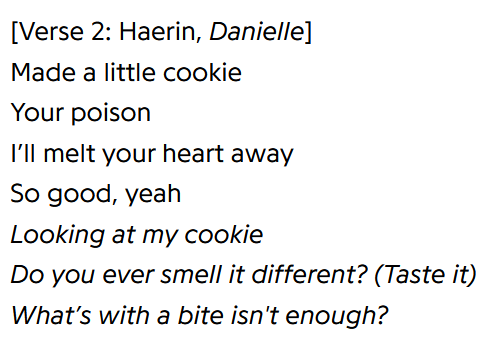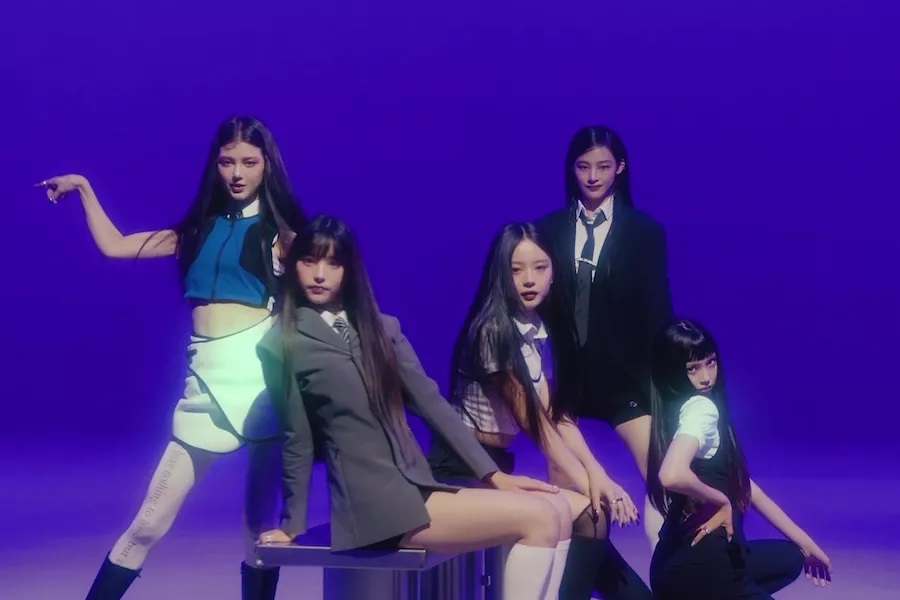Despite it being blatantly obvious to anybody who understands anything that NewJeans‘ “Cookie” included sexual innuendo and was suggestive throughout, some fans and CEO Min Hee Jin have maintained that it was just about making cookies and was completely innocent in nature.
Now ADOR has released their detailed rebuttal of sorts where they seemed to reply as if they had a word count to meet, so let’s cut the fat.
In contrast to the emphasis on choreography in “Hype Boy,” “Cookie” is consciously focused on the music. The song revolves around the paired idea of burning CDs and baking cookies, which share the same conceptual verb in Korean. We backed this with a beat that you don’t often get to hear when it comes to K-pop girl groups, signaling the daring new direction we’re taking. Lyrically, dinner and water are synonymous with staple foods and, in the context of our song, represent just going through the motions. When you reach for dessert instead, you’re looking for something more exciting than an everyday meal that goes beyond merely filling you up and tastes great, too. “Cookie” has the confidence to do just that while remaining humble enough to call itself a dessert and express that in a cute way. The underlying message of the song is the value of NewJeans’ attempt to make new and original music. That’s why, even though we produce NewJeans’ music and all the related content for everyone to enjoy, it “ain’t for free” and can only be found at our place ADOR, pointing listeners toward the whole message the group ultimately aims to convey through their debut album. The music video opens with a cookie rolling in and ends with a CD rolling out. This unexpected change was meant to drive the message home further. We took this symbolism one step beyond that and brought it to life with a CD player bag to carry the album that specifically echoes the shape of a cookie.
So basically, the start of their statement is a long-winded way of saying they’re sticking to their defense that it was just about cookies at its core. It’s possible that this explanation they’re providing was one intention of the lyrics and concept, or at least they believe it’s plausible enough to retcon in now that they’re under fire.
Things start to fall apart later, though.
The ADOR team didn’t take any issue with the lyrics to “Cookie” when we were making the album because our vision for original and wholesome music was crystal clear to us. Slang terms aren’t taught in school and not everyone is familiar with them. It’s impossible for people to be familiar with every idiom and offensive term out there, and predicting their reception around the world is an even more challenging task. To be sure, we consulted with English professors, professional interpreters, translators, and native speakers about this issue, who suggested it isn’t a commonplace interpretation and one they had to look up as they were unfamiliar with it themselves. The common thread in all of their opinions was that it’s very problematic to put total confidence into any one interpretation, that a person’s understanding relies on a mix of objective facts and personal experience, and that this must all be considered together in a wider context. They added that the word “cookie” is also not a commonly used slang term for anything sexual and therefore not a problematic word itself, but that any listener could take the word to mean something different depending on their personal experience and exposure to certain slang meanings. They also gave no credit to the argument concerning singular and plural use of the word as both are extremely commonplace, noting that if someone’s goal is to find ill-intentioned meaning or interpret it as slang used among a small subset of people then they will, but that they would be wrong to conclude with any certainty that this is in line with any definitive meaning.
Emphasis mine.
Come on, man. Be serious. This is just bullshitting, like there is nobody who speaks English that would read those lyrics, especially already knowing what the controversy was, and think the euphemism wasn’t blatantly obvious.
Like at the very least they would not be completely unfamiliar with the slang. I can only imagine they were coaxing a lie out of them or are just straight-up lying about talking to them.
Considering how common it is to use friendly and familiar imagery like a cookie even in content targeted toward the youngest children, it would be nonsensical, for example, to stir up controversy over the American tradition of Girl Scouts knocking on strangers’ doors to sell their cookies, or the flyers reading, “Get your Girl Scout Cookies before it’s too late! Ask my daughter today.” Perhaps most importantly, as we touched upon before, we used the idea of a cookie to represent the singular thing that breaks us out of the ordinary—that is, music, and therefore the album—and “it” was best represented consistently throughout the translated lyrics in singular as opposed to switching haphazardly between “cookie” and “cookies.”
Because the context around that Girl Scouts scenario is clearly about buying cookies, so yeah. On the other hand, if the Girl Scouts started saying shit like below while doing a dance in a crop-top and short skirt on a dimly-lit, hazy stage…

…then yeah, absolutely it would fucking creep me out and I wouldn’t think it was about literal cookies. Come on.
After this issue arose, we took it upon ourselves to research different slang terms, finding there exist wildly different and unexpected meanings for everyday words like cake, biscuit and rice, strawberry, melon, and more. If someone wants to stir up controversy, then, it isn’t any specific words that’s problematic but any words they choose to target at all. Importantly, words take on entirely different informal meanings in the context of different cultures, places, and at different times in history, so judging how suitable any one word is is ambiguous at best. Considering that, it’s difficult for any song lyrics to ever be free from disputes. Rather than mention any of the readily available examples and risk offending anyone, consider this scenario provided by a native English-speaking professional translator: “If an English song had the line, ‘Hey little puppy, eat this taffy, yum,’ and someone wanted to read it literally into Korean slang—which would basically say, ‘Hey you s***head, go f*** yourself’—what should we do about a viewpoint like that?”
Emphasis mine.
Yeah, and if surrounded by suggestive lyrics, then it’s easy to say that’s what they intended with those as well. That’s literally the problem and how these innuendos came to be.
Similarly, if the English song in this made-up scenario was confrontational, was written by a Korean, and was performed half in Korean, then absolutely you could say maybe that’s what was intended.
We at ADOR are incredibly grateful for everyone campaigning to ensure minors are protected and who share their good ideas and helpful opinions. We see you, we thank you, and we respect you. What we don’t condone, and what we regret to see, is those people who stir up controversy for its own sake but under the deceptive guise of protecting minors. Going beyond misinformed speculation and hasty judgment and as far as to try and make a point by putting words in the mouths of minors in a provocative thumbnail can hardly be seen as protecting them in good faith. It seems inappropriate to fill the heads of the very people they claim to want to protect with slang terms they’re unlikely to learn anywhere else using sensational means.
This is just pandering fodder to their fandom to offer up for them to use as a defense, trying to pin everything on antis as if it’s a literal Stan Twitter thread. Just gaslighting the shit out of regular people who saw something completely obvious and spoke out about it, with them now trying to turn it around as if it’s their fault for noticing.
The lyrics to “Cookie” were written by two native English speakers: a Korean woman and a Swedish woman in their 30s. The song was also translated by a bilingual Korean woman. Given how sure we were in our vision, everyone was stunned when the issue arose. Still, we were under fire from a false accusation saying the lyrics were presumably written by a man in an apparent attempt to distort our intention. Aside from assumptions around gender, we also saw hasty judgment made around the question of age. The ADOR team has also been concerned about the way NewJeans has been portrayed as an unusually young group (with two 19-year-old members and the others 18, 17, and 15 in Korean age) when other teenage groups have similar lineups, as well as the stereotype some people hold that young people are unassertive and uninvolved with the world around them.
Emphasis mine.
Yes, that’s what makes people think the excuse you’re trying to make here is ridiculous. Thanks?
Additionally, while I did agree that singling out NewJeans as an underage group is unfair, that also has nothing to do with “Cookie”.
It’s possible that this long explanation would have no sway over people who have already made up their minds about the issue. Despite our best efforts, we’re worried whether we’ll be able to deal with each and every harmful interpretation with malicious intent behind it for that reason. After all, a toxic perspective can take something harmless and see it as something that’s anything but. We believe the most important factor when it comes to interpretation is context. As always, context is key.
There’s an irony in ADOR saying context is key in relation to their defense of “Cookie” because the context is literally what makes people take issue with the song. If just the word ‘cookie’ was involved somehow, nobody would be making a huge fuss over this. The fact that the surrounding lyrics are suggestive or straight-up innuendo, the song’s topic is a partner (boy, specifically), and that the music video doesn’t exactly fit the innocent and wholesome claims either is what people reacted to.
——
After reading the statement, my primary takeaway is that at some point they realized they fucked up and went around everywhere desperately trying to retcon “Cookie” to make it less creepy so they could try to convince enough people that at least it was a misunderstanding of some sort. It’s damage control, and it’ll work well enough, especially since this kind of thing has been common enough in K-pop that people mostly don’t care. NewJeans’ runaway success despite any fallout from this and the discourse surrounding Min Hee Jin is evidence enough.
The point here isn’t even to say that you can’t contribute to their success by liking NewJeans, hell I like their songs myself, but one can still admit the company continuing to play dumb about this and treating everybody like they’re complete rubes is just eye-roll inducing and honestly an embarrassing look. I understand there’s always plausible deniability for companies with regards to these types of things, it’s meant to be that way and it’s especially the case because fans will be so lenient, but it’s telling that “Cookie” was so blatant that it’s clearly testing even those limits.
 Asian Junkie Asian pop. Without discretion.
Asian Junkie Asian pop. Without discretion.
